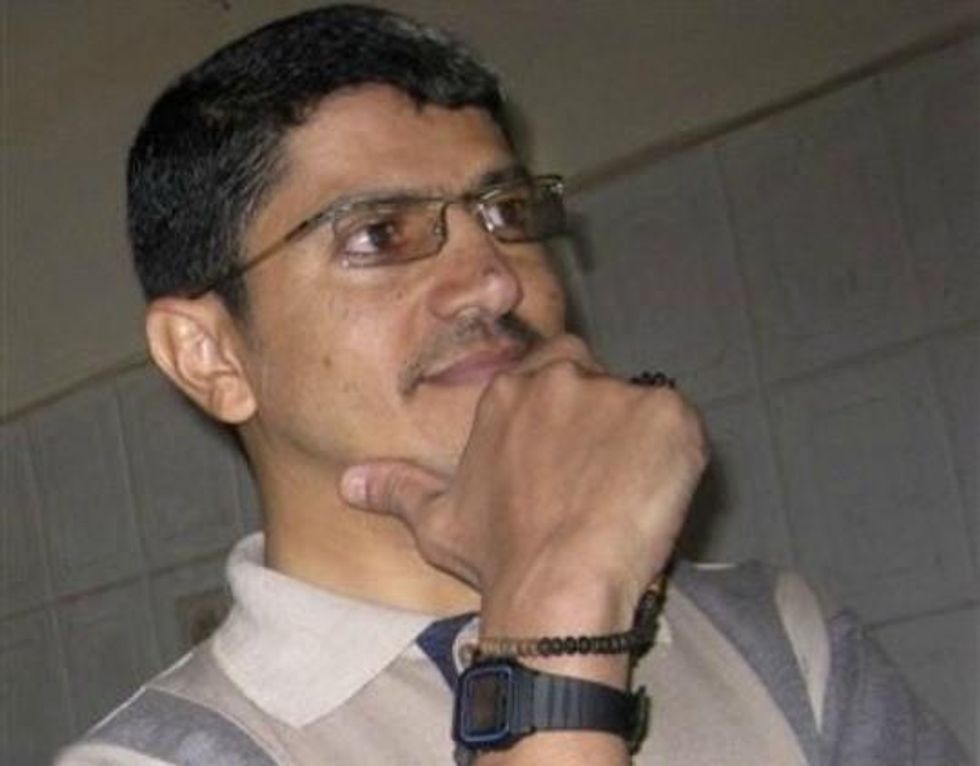Obama 'Disappointed' with Release of Celebrated War Reporter
Abdulelah Haider Shaye 'put in prison because he had the audacity to expose' deadly US drone strike

Following news of Shaye's release, journalist Jeremy Scahill, who has written extensively about Shaye's story, contacted the White House for a comment.
The White House's response was brief and alarming:
We are concerned and disappointed by the early release of Abd-Ilah al-Shai, who was sentenced by a Yemeni court to five years in prison for his involvement with Al Qaeda in the Arabian Peninsula.
According to Scahill and numerous other journalists who have followed the story, Shaye's only involvement with Al Qaeda was conducting interviews with their members for major news outlets that included the Washington Post, ABC News and the New York Times.
Shaye's legal troubles only arose after he uncovered the deadly U.S. strike that killed dozens of innocent Yemeni civilians, after which he was thrown in prison. At one point Shaye was slated for early release, but a phone call from president Obama urged Yemeni officials to keep him behind bars.
"We should let that statement set in," Scahill said of the White House's response. "The White House is saying that they are disappointed and concerned that a Yemeni journalist has been released from a Yemeni prison."
"This is a man who was put in prison because he had the audacity to expose a U.S. cruise missile attack that killed three dozen women and children."
Watch Scahill in an interview with Democracy Now!, which aired Thursday morning:
An Urgent Message From Our Co-Founder
Dear Common Dreams reader, The U.S. is on a fast track to authoritarianism like nothing I've ever seen. Meanwhile, corporate news outlets are utterly capitulating to Trump, twisting their coverage to avoid drawing his ire while lining up to stuff cash in his pockets. That's why I believe that Common Dreams is doing the best and most consequential reporting that we've ever done. Our small but mighty team is a progressive reporting powerhouse, covering the news every day that the corporate media never will. Our mission has always been simple: To inform. To inspire. And to ignite change for the common good. Now here's the key piece that I want all our readers to understand: None of this would be possible without your financial support. That's not just some fundraising cliche. It's the absolute and literal truth. We don't accept corporate advertising and never will. We don't have a paywall because we don't think people should be blocked from critical news based on their ability to pay. Everything we do is funded by the donations of readers like you. Will you donate now to help power the nonprofit, independent reporting of Common Dreams? Thank you for being a vital member of our community. Together, we can keep independent journalism alive when it’s needed most. - Craig Brown, Co-founder |
Jacob Chamberlain is a former staff writer for Common Dreams. He is the author of Migrant Justice in the Age of Removal. His website is www.jacobpchamberlain.com.

Following news of Shaye's release, journalist Jeremy Scahill, who has written extensively about Shaye's story, contacted the White House for a comment.
The White House's response was brief and alarming:
We are concerned and disappointed by the early release of Abd-Ilah al-Shai, who was sentenced by a Yemeni court to five years in prison for his involvement with Al Qaeda in the Arabian Peninsula.
According to Scahill and numerous other journalists who have followed the story, Shaye's only involvement with Al Qaeda was conducting interviews with their members for major news outlets that included the Washington Post, ABC News and the New York Times.
Shaye's legal troubles only arose after he uncovered the deadly U.S. strike that killed dozens of innocent Yemeni civilians, after which he was thrown in prison. At one point Shaye was slated for early release, but a phone call from president Obama urged Yemeni officials to keep him behind bars.
"We should let that statement set in," Scahill said of the White House's response. "The White House is saying that they are disappointed and concerned that a Yemeni journalist has been released from a Yemeni prison."
"This is a man who was put in prison because he had the audacity to expose a U.S. cruise missile attack that killed three dozen women and children."
Watch Scahill in an interview with Democracy Now!, which aired Thursday morning:
Jacob Chamberlain is a former staff writer for Common Dreams. He is the author of Migrant Justice in the Age of Removal. His website is www.jacobpchamberlain.com.

Following news of Shaye's release, journalist Jeremy Scahill, who has written extensively about Shaye's story, contacted the White House for a comment.
The White House's response was brief and alarming:
We are concerned and disappointed by the early release of Abd-Ilah al-Shai, who was sentenced by a Yemeni court to five years in prison for his involvement with Al Qaeda in the Arabian Peninsula.
According to Scahill and numerous other journalists who have followed the story, Shaye's only involvement with Al Qaeda was conducting interviews with their members for major news outlets that included the Washington Post, ABC News and the New York Times.
Shaye's legal troubles only arose after he uncovered the deadly U.S. strike that killed dozens of innocent Yemeni civilians, after which he was thrown in prison. At one point Shaye was slated for early release, but a phone call from president Obama urged Yemeni officials to keep him behind bars.
"We should let that statement set in," Scahill said of the White House's response. "The White House is saying that they are disappointed and concerned that a Yemeni journalist has been released from a Yemeni prison."
"This is a man who was put in prison because he had the audacity to expose a U.S. cruise missile attack that killed three dozen women and children."
Watch Scahill in an interview with Democracy Now!, which aired Thursday morning:

